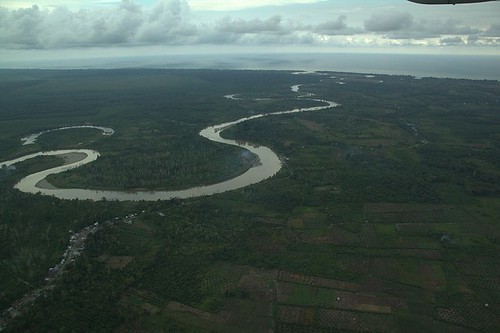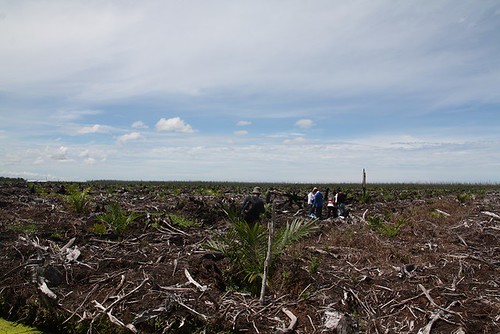
Photo By Yusriadi, Walhi Aceh (August 3, 2012)

Photo By Yusriadi, Walhi Aceh (May 5, 2012)
The rapid expansion of oil palm plantation in Southeast Asia has given rise to more violent conflicts between local people in the area of concession and the entrepreneurs including local, national and multinational capitalists.
It has also led to conflicts between local people and the state that has given permission the private sector to carry out the oil palm plantation. It has escalated to disputes between the state and the investors who have been awarded the concessions in some areas.
The case to be explained is an example of dispute in Aceh located in North Sumatra, Indonesia. It is a hub of oil palm plantation by local, national and multinational investors.
In this case, the Ministry of the Environment sues for damage claim from PT. Kalista Alam (PT Kalista Alam (PT=Perseroan Terbatas means “company”) with the Meulaboh Court on 8 November 2012 accusing PT. Kalista Alam of illegally setting fire and causing damage to the environment in the Tripa Peat Swamp Forest, as per the case no.12/pdt.G/2012/PN–MBO.
The first hearing of the case took place on 27 November 2012, but the defendants have failed to turn up. Thus, the trial was postponed to 12 December 2012.
After getting briefing of the case from Firman Hidayat, an environmental reporter from The Globe Journal who has bee monitoring issues in the Tripa Peat Swamp Forest since the beginning and Muhammad Nizar Abdurrani, Deputy Direction of Walhi Aceh, I decided to accompany Firman Hidayat to attend the court hearing in the Meulaboh Court.
During the night of 10 December 2012, I departed from Banda Aceh to catch up with Firman Hidayat who had already traveled there. My bus traveled to the destination with limited speed. The road system there is on par with rural road system in Thailand. I arrived in Meulaboh almost at dawn.
As it took me the whole night to ride on the bus, I decided to rest during 11 December 2012, then to join the group activists who had come from Banda Aceh before me.
On 12 December 2012, the second hearing on the case in which the Ministry of the Environment sues PT. Kalista Alam for destroying Tripa Peat Swamp Forest took place. We came out from our place to the Court in the early morning.
The Meulaboh court complex is located in Aceh Barat and houses both the Civil Court and Criminal Court. The atmosphere in the court was relaxing, but caution was applied to ensure security as foreigners including me attended the hearing that day.
As the defendants arrived fifteen minutes late, so did the commencement of the trial.
The atmosphere in the Meulaboh Court was quite active teemed with a team of reporters, foreign researchers and environmental activists who have paid special attention to the case.
As the court procedure was not so strict, everyone was allowed to attend the trial.
During the trial, the court gates were still open, and people were walking about. Some passersby stopped just to hear the trial.
Behind seat rows where the trial attendees were seated, there was a ping pong table. It even made the atmosphere informal and casual, as if one was sitting in a guest room.
The hearing lasted not long. It was ended after Rebecca Imelda, an attorney, informed the Court that she was appointed to defend PT. Kalista Alam, though the official appointment paper from her company has not yet arrived.
Judge Rahmawati SH – (SH = lawyer) decided to postpone the case to 7 January 2013.
Rebecca Imelda told The Globe Journal’s reporter that she was just asked by PT. Kalista Alam to take care of the case. The official appointment was not done since the company was too busy looking for information to prepare for the defence.
Meanwhile, Syafruddin SH, the prosecutor, told us that if the defendant, PT. Kalista Alam, continued to buy time, the Court might rule that the Ministry of the Environment wins the case, though it was eligible for PT. Kalista Alam to appeal the case.
The court procedure seems to differ from the court in Thailand, though.
As the hearing ended so quickly, we had some time left to explore the place. The relaxing atmosphere during the trial at the Meulaboh Court made me feel tempted to attend a hearing by the Sharia Court, the religions court, which was conducting a trial in another district two hours away from where I was.
Alas, I had to cancel the plan as someone in our entourage had to rush back to attend a wedding of relatives.
A car took us back to Banda Aceh on a newly paved road, rebuilt after Tsunami in late 2004. It treads along the Western coast of Aceh through Aceh Barat, Aceh Jaya, Aceh Besar and Banda Aceh, about 180 kilometers. It takes five hours to cover the length on public buses.
The road has been made possible by funding from USAID or the United States Agency for International Development. As a result, the road is called “USAID” by local people. Part of it is being expanded, the others were being repaired.
Flanked by palm trees, the road gives you view of both newly planted and formerly planted palm trees. Some are dead, though.
The road cuts through peat swamp forests, mountain ranges and plain areas. Through peat swamp forests, one can see oil palm plantations. The mountains are still covered by forests, though. Communities are found on low-lying areas. Paddy farming and orchards are a unique aspect of life in Aceh.
After that, I monitored progress of the litigation by the Ministry of the Environment against PT. Kalista Alam for burning and destroying the environment of Tripa Peat Swamp Forest from website of The Globe Journal. It was reported by the website the 7 January 2013 hearing, the third in the case, has also been postponsed by the Court as PT. Kalista Alam’s attorneys failed to establish the Court the document appointing her as the company’s legal representative and the power of attorney expired since 31 December 2012. Thus, it was put off to 16 January 2013, when both parties agreed to negotiate to resettle the case.
Then, on 30 January 2013, during the first negotiation, the Ministry of the Environment asked for 300 billions rupiahs from the company, and no agreement has been reached.
Another case that interested me was filed by PT. Kalista Alam with the Aceh Court accusing the Governor of Aceh for abusing his power in revoking permission to carry out plantation of economic crops in the Tripa Peat Swamp Forest. The case was accepted by the Court as the case no.18/G/2012/PTUN–BNA.
According to a briefing by Muhammad Nizar Abdurrani, when Irawandi Yusuf was Aceh Governor, he issued permission to carry out plantation of economic crops in the Tripa Peat Swamp Forest to PT. Kalista Alam, dated 25 August 2011. The license no. 525/BP2T/5322/2011 allowed that company to implement oil palm plantation in peat swamp forest which was three meters deep. But according to the Indonesias regulations, peat swamp forests at three meters deep are classified as protected forests.
WALHI Aceh, an environmental NGO, filed a case against the Aceh Governor with the Aceh Administrative Court on 23 November 2011.
On 3 April 2012, the Aceh Administrative Court dismissed the case.
WALHI Aceh appealed with the Medan Administrative Court as per the case No.89/B/2012/PTTUN–MDN. The verdict was delivered on 30 August 2012 as WALHI Aceh won the case. Later, PT. Kalista Alam appealed with the Jakarta Supreme Court and the trial is ongoing.
Zaini Abdullah, the incumbent Aceh Governo, was just winning his election and ascending to power in April 2012. He decided to revoke the licenses given to PT. Kalista Alam as per the order no. 525/BP2T/5078/2012 dated 27 September 2012.
That prompted PT. Kalista Alam to file a case against the Aceh Governor for revoking the permission with the Banda Aceh Administrative Court.
The Banda Aceh Administrative Court held the first hearing on 13 December 2012 with about 50 students protesting against PT. Kalista Alam being gathered in front of the court building.
The students claimed that the case filed against Aceh Governor by PT. Kalista Alam was an attempt to prevent him from protecting Tripa Peat Swamp Forest. They were holding placards and banners and making speeches through megaphones exposing damage done on Tripa Peat Swamp Forest. They asked the Aceh people to help protect the peat swamp forest and urged the Court to hear the case carefully.
Police forces and trucks for holding offenders were deployed in front of the Court to prepare for any violence.
The students distributed fliers and made speeches through megaphones in front of the Court and no violence gesture was made. At shop stalls right by the Court, leaflets were left for people to pick up and read. Part of them explained the reasons of protest that;
“The revocation of permissions issued to PT. Kalista Alam indicates how interested the government is to protect Tripa Peat Swamp Forest. But the company got back at the Governor who wanted to protect the peat swamp forest. We the students and groups protecting Tripa Peat Swamp Forest have to come out and protest.”
The leaflets also implored the Judges to use their utmost prudence in hearing the case as the company’s implementation was still active in the area of 1,605 hectares for which the licenses had been given.
Eventually on 2 May 2013, the Aceh Administrative Court ruled that PT. Kalista Alam won the case. Meanwhile, the Aceh Governor appealed with the Medan Administrative Court, and material evidence was being prepared.
Hearing about the lawsuit filed by a state agency in Indonesia against private investors reminds me of the operation of local villagers who raided and occupied oil palm plantations belonging to both national and multinational investors in the provinces of Surat Thani and Krabi, the case of which shocked me. There seem to be just two cares whereby the authorities have come out to litigate against the oil palm industry that had encroached on forests in Surat Thani.
They were the case filed by the Office of Land Reform for Agriculture against Jew Kung Jui Development Co. from Malaysia for encroaching and planting oil palms on land classified for land reform. Both the Lower Court and the Appeals Court ruled that the Office of Land Reform won the case. It is still pending in the Supreme Court, though.
Another case is filed by the Office of Land Reform for Agriculture against United Palm Oil Industry PLC for encroaching on land classified for land reform. Later the company decided to return the land to the Office of Land Reform.
Meanwhile, a vast tract of land in both provinces has been illegally exploited by investors. Some continue to harvest produce on the land whose leases have already expired and they refused to return the land to the state. Some planted oil palm in area more than what is provided by the state. Some even encroached and illegally planted palm trees there.
This is to mention peat swamp forests and wetland in the Songkhla Lake which have been subjected to excessive encroachment. The Kruan Kreng peat swamp forest has been ravaged by man made fires time and again, yet the government has failed to take action.
This is one of the differences between Thailand and Indonesia from my own experience.
-----------------------------------------------
“The views of the author do not reflect those of the API Fellowships Program, The Nippon Foundation, the Coordinating Institution, and/or the Partner Institutions”
Read the article in Thai

